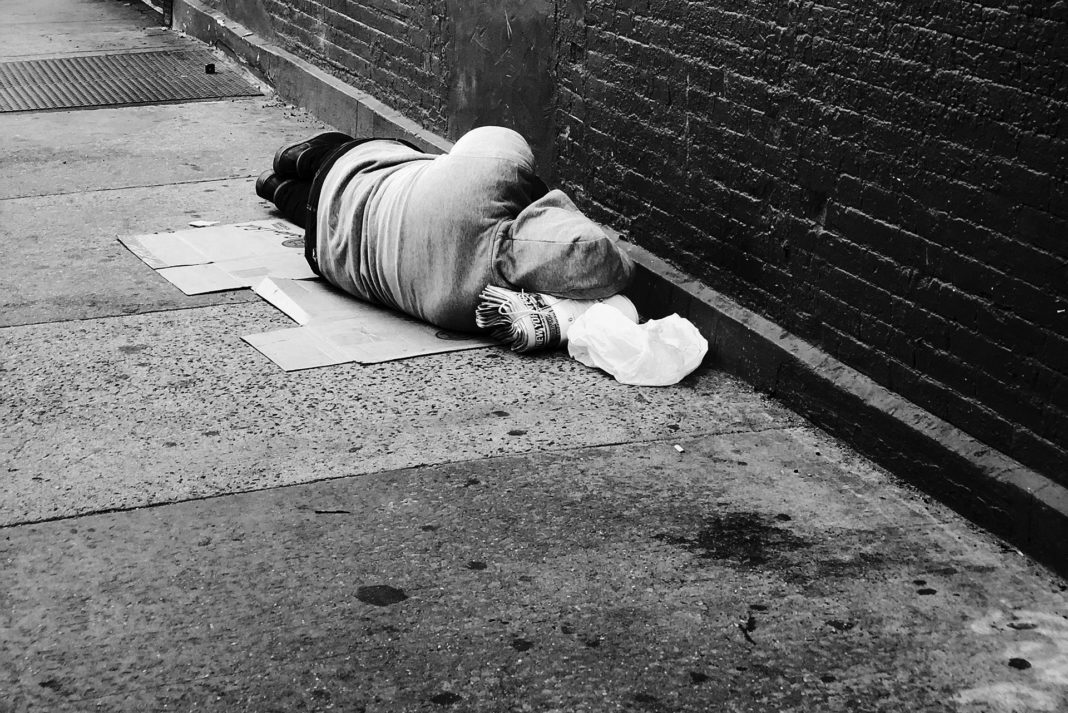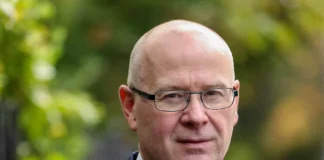Cork Penny Dinners co-ordinator Catriona Twomey has spoken out against sexual assaults against homeless people on the streets of Cork City, something she says is a regular occurrence hidden in plain sight.
“Women are being raped on the streets of Cork – and some men are too – and they have no place to go, no-one to turn to, and they are left to just curl up in a ball on the street, in the Taoiseach’s home-town.”
Catriona Twomey is one of the most trusted and respected people in Cork. Her words carry weight, and when she speaks, people listen. Catriona has no agenda, bar the one she advertises clearly. Seven nights a week she is out on the streets with volunteers from Cork Penny Dinners, and seven days a week, 52 weeks of the year, they feed and look after the people the rest of us walk past and ignore.
Last week Catriona Twomey recounted to Sarah Horgan of The Echo her own recent experience of physically preventing a man from raping an unconscious homeless woman. She also described a similar incident in which another homeless woman was attacked. In both cases the assailants were also homeless and known to their victims.
When I spoke with Catriona about that interview, she was at pains to tell me: “Most of the homeless men in Cork are fabulous people, the vast, vast majority of them are, and indeed some of the homeless men in Cork have themselves been sexually assaulted.”
Covid-19 has necessitated a change in the way Cork Penny Dinners does its business, with the lockdown seeing the charity’s doors closed for the time since it was founded in the days of the Famine. Nowadays, anyone calling to Penny Dinners is provided with a takeaway dinner, and volunteers set out every evening from Little Hanover Street around half-seven, the big white van heralded by a vanguard of outriders on bicycles, the Cork Penny Dinners Knight Riders. They cover the city and they deliver hot meals to homeless people in B&Bs and hostels, and to rough sleepers all over Cork. Some of the lads on bikes are former homeless people themselves, and some are recovering addicts.
I asked Catriona if she is concerned about a rise in sexual assaults against homeless people in Cork.
“I’m beyond concerned,” she said. “Words fail me, to be honest. I’m deeply, deeply worried.
“Rape can be a life-destroying event, but we tend to think of rape as a once-off, catastrophic occurrence. But for homeless women – and for some homeless men, too – being raped could be something that is happening to you several times a week, or even several times in a night.
“Rape is a horrific crime for anyone, at any time, something which can destroy your mental health, and ruin your sense of yourself, but for homeless people, especially homeless women, rape can almost be a fact of life.
“And maybe it can become easier to allow the assault to happen to you than to try to defend yourself, because you feel you have nobody to defend or protect you, and if you try to stand up you might end up dead.
“For most of us, though, if – God forbid – we were attacked in such a way, we would hope to at least have a network around us, family, friends, and the knowledge that the Gardai and people like Mary Crilly of the Sexual Violence Centre in Cork are there for us.
“The Sexual Health Centre, around the corner from us on Peter Street, do brilliant work, and I think it’s important to let people know that service is there.
“The Gardai are simply brilliant. They are always the soul of kindness to members of the homeless community, and I have seen them, time and again, go above and beyond the call of duty to help people in need, and I’ve seen how gentle they are with survivors of sexual crimes. I’ve often seen Guards left devastated by the things they see.
“But for homeless people, after they go to the Gardai, they have to return to the streets, and there can often be a fear of a backlash.
“You could go from reporting a rape to meeting your rapist again and again.”
“A scream wouldn’t help you.”
Lockdown made things worse for some homeless people, Catriona says: “A scream wouldn’t help you, because there was nobody there to hear you.” She says the isolation and loneliness of homelessness can be an aggravating factor for homeless victims of sexual assault.
“Can you imagine, though, being utterly alone, with no-one to help you? After you’ve been attacked in the most horribly personal way? Imagine if you had no-one to call on for help, or just a hug, and you felt you had nowhere to go to try and clean yourself up.
“Imagine if you had nowhere to go, even for a little cry for yourself.
Rape can be a concern for homeless men, too, she says: “Being raped or sexually assaulted is something which would probably never even cross the minds of most Irish men, but for some homeless men, no more than for homeless women, rape is a constant fear.”
Mary Crilly founded the Sexual Violence Centre – formerly the Cork Rape Crisis Centre – in 1983. Catriona Twomey calls Mary Crilly “My hero, my life-long hero. That woman has done more for Irish women, and for longer, than nearly anyone else has”.
Mary told me last week that she sees what is happening on the streets as a symptom of a wider problem in Irish society.
“One in five Irish girls or women will suffer rape or sexual assault in their lifetimes. Think about that. One in five girls or women, regardless of what community they are in, whether they are homeless or living in houses. Women who are homeless are far more vulnerable, and vulnerable women are seen, by a minority of men, as fair game.”
Speaking last week on Newstalk, Mary Crilly said she has spoken with countless women who are homeless as a result of sexual abuse suffered in childhood.
“They say to me, ‘I can’t keep count of the amount of times I’ve been raped. I was abused as a child, and I’ve been raped so many times, on the streets’ … most times they’ve been raped by someone they know, someone who might be homeless, or someone who’s befriended them. Like in any part of society, 80% of people are raped by somebody they know.”
Dr Sharon Lambert is a lecturer and researcher in the School of Applied Psychology, University College Cork, and her research into the childhood factors which contribute to homelessness chimes with the experiences related by homeless women to Mary Crilly.
“Homelessness in itself is a psychologically traumatic experience and many people experiencing homelessness are exposed to multiple traumas such as sexual violence and physical assaults. These extremely traumatic events impact on mental wellbeing and can increase the need for substance use to manage the distress. Services need to be mindful of the possibility of trauma histories in those who are homeless and understand that some behaviours that are viewed as challenging are in fact psychological trauma symptoms.”
On Newstalk, Mary Crilly said many of the women on the streets who suffer sexual assault and rape are often reluctant to press charges due to fear of the court process.
“They won’t go that far because they’ll say, ‘What is the point?’ That is the huge sadness about it. That something so horrific is happening to a human being in our society and they turn around and say what is the point? I won’t get justice; I won’t be believed; I am not worth it anyway; it doesn’t matter.”
“Get the people off the streets. It’s that simple.”
Noeline Blackwell, CEO of the Dublin Rape Crisis Centre, told me the sexual abuse of homeless people is a real problem hidden in plain sight everywhere, not just in Cork.
“We do awareness raising training with people working in homeless agencies and they tell us that it is a common risk for those who are homeless, especially rough sleepers. They are so vulnerable. Echoing Mary Crilly, this tends to remain hidden because of the lack of prosecutions due to many factors including lack of faith in official systems, a sense that they won’t be believed.”
Dr Cliona Sadlier, Executive Director of Rape Crisis Network Ireland, says that rape can be both a cause of homelessness and a risk arising from homelessness.
“Sexual violence against homeless people cannot be treated separately from the crisis that is homelessness. We have to treat this holistically, and to recognise that the homeless person’s most immediate vulnerability is homelessness. We have to put the person at the centre and then look at a multi-agency response.”
I asked Catriona Twomey what we can do to prevent the sexual assault and rape of homeless people on the streets of our towns and cities.
“Get the people off the streets,” was her response. “It’s that simple. Put the people first and get them off the streets.”
Catriona says that while a single issue might force a person into homelessness, homelessness will soon cause that person to have ten or more issues.
“I’m looking every day at the emptiness and despair in the eyes of human beings. Unless we are willing to invest in a full, wraparound system of support for homeless people, we won’t help them, and we’re wasting our time pretending we care.”
Noeline Blackwell concurs: “There are so many reasons to end rough sleeping – and the ever-present risk of sexual assault is just one of them. It would require a complex response to meet the needs of these very vulnerable people but the numbers aren’t huge and it could be done with commitment and resources.”
Sharon Lambert agrees that the best response to homelessness is to begin with housing.
“You have to meet people’s basic needs first before you can attempt any type of therapeutic treatments. People need physical and emotional safety to be able to address mental health and/or addiction. Housing first has been very successful in many regions.”
Mary Crilly, almost four decades on since the founding of the Sexual Violence Centre Cork, says that with one in five girls and women facing rape or sexual abuse in their lifetimes, Ireland needs to address its unspoken tolerance of sexual violence.
“Thirty-seven years we’re here. My most fervent wish would have been that we wouldn’t still be needed.”
I asked Catriona Twomey what message she would give to Darragh O’Brien TD, the new Minister for Housing.
“I would say to Darragh O’Brien this: A lot of people have been in that office before you, and you’ll either end up like them, or you’ll break the mould. And we desperately need you to break the mould.
“Between thirty and sixty people are sleeping on the streets of Cork, the Taoiseach’s home town, every night, and they are desperately vulnerable. Stop telling us there are enough beds. There aren’t. We need smaller hostels, and we need separation of people within those hostels. Older, younger, male and female. Stop lumping people in together.
“People are being raped on our streets. That they are homeless people doesn’t make them people any the less.
“Everybody has a story, and nobody is beyond help. So, please, Minister, help us.
“Help us, or go the way of all the other people who occupied that office.”
If you or someone you know has been affected by sexual violence, please know that help is only a call or a click away.
Sexual Violence Centre, Cork: 1800 496496 Text: 087 1533393
Dublin Rape Crisis Centre: 1800 778888
Cork Penny Dinners cannot at the moment receive donations of clothes and nursery items, but the charity is appealing for donations of tinned food. Money donations, however small, can be made by PayPal on the Penny Dinners website. 021 4275604.








